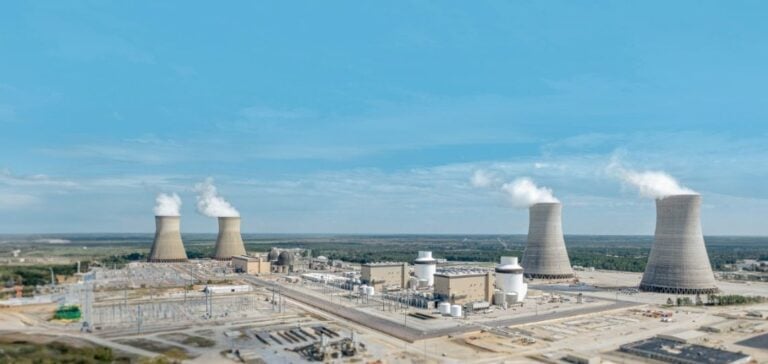The United States is facing a substantial increase in electricity demand, driven by growing electrification and the rise of energy-intensive consumers such as data centers.
To meet this trend, the Department of Energy (DOE) estimates that existing nuclear sites and former coal-fired power plants can add up to 269 GW of additional nuclear capacity.
The report published on September 9 explores in detail the opportunities offered by these sites to support the expansion of the US nuclear fleet.
Potential of existing nuclear sites
The DOE evaluated all 54 operating nuclear sites and 11 recently closed sites in 31 states.
Of these sites, 41, located in 24 states, have the space to accommodate new 1,117 MW light water reactors.
These units, such as the AP1000 already operational in Georgia Power Co.’s Vogtle plant extension, could add up to 60 GW of capacity.
If smaller reactor technologies, such as small modular reactors of 600 MW or less, become viable, additional capacity could reach 95 GW.
The appeal of these sites lies in their existing infrastructure and “license pedigree”, facilitating the regulatory process for siting new reactors.
Existing sites also have the advantage of being integrated into communities accustomed to nuclear operations, which can reduce local resistance.
Conversion of Coal Sites to Nuclear Power
In addition to existing nuclear sites, the DOE examined the potential of 145 former coal-fired power plant sites across 36 states.
These sites, with a transmission capacity of at least 600 MW and closed since 2020 or still in operation, could accommodate between 128 and 174 GW of new nuclear capacity.
Sites closed before 2020 have been excluded, as they are often converted to other uses or disconnected from the electricity grid.
Adding nuclear capacity to these coal-fired sites would leverage existing electricity infrastructure and maintain local employment by transitioning workers’ skills from coal to nuclear.
This presents a strategic advantage by minimizing the cost of building new infrastructure while facilitating local acceptance.
Financial and regulatory issues
Despite the opportunities, a number of challenges remain, notably financial and regulatory.
The cost of installing new nuclear capacity, whether large reactors or more advanced technologies, remains a major obstacle.
The DOE stressed that current incentives are generous, including tax credits and subsidies.
However, industry players, including nuclear developers, believe that additional support may be needed to catalyze new investment.
Strict regulatory requirements for nuclear power represent another major challenge.
While existing nuclear sites benefit from a history of compliance, converting coal sites would require extensive and potentially costly approval processes.
Discussions around streamlining these processes to encourage investment are ongoing.
Strategic Perspectives for Nuclear Expansion
DOE’s analysis highlights strategic prospects for America’s energy future.
Utilizing already operational or recently retired sites, whether nuclear or coal-fired, offers an economically viable alternative to building new facilities on greenfield land.
Building on existing infrastructure and increased local support, the nuclear industry could see rapid expansion.
Diversification of reactor types, from large traditional reactors to small modular reactors, could also play a key role in this expansion.
Small modular reactors, in particular, offer greater flexibility in terms of location and cost, making them easier to set up in smaller or densely populated areas.






















